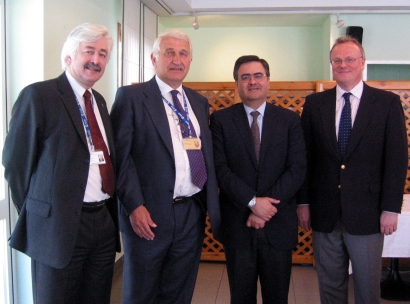Tribute to a Colleague
28 November 2005
SciTech pays tribute to Willem Wamsteker the man behind one of the longest missions in astronomy, IUE, who died recently.Willem Wamsteker was born in Haarlem, The Netherlands on 23 November 1942, went to school in Overveen and then went to study at the Sterrewacht – part of Leiden University. In 1969 he moved to the United States where he stayed until 1975. While in the US he worked with G.P. Kuiper at the University of Arizona where he made observations of the satellites of the major planets that later formed the basis of his Ph.D. thesis. He also worked at NASA's Marshall Space Flight Center. He obtained his Ph.D. in 1975 at Leiden, under H.C. van de Hulst, with his thesis on "A Narrow Band Spectrophotometric Study of the Major Planets and their Large Satellites".
In 1975 Willem moved his family to Chile where he worked as a Staff Astronomer for ESO (European Southern Observatory). He joined the Agency in 1980 as an IUE Fellow at Vilspa and in fact his entire career was spent at Vilspa (now the European Space Astronomy Centre - ESAC). He worked as International Ultraviolet Explorer (IUE) Observatory Controller, Project Scientist and Project Manager until the mission was terminated in 1996. IUE was ESA's longest lasting science project.
Willem did not finish with it at termination. He then brought the project to an effective conclusion, including the IUE New Extracted Spectra System (INES), the archive system set up in cooperation with the Spanish institute Laboratorio de Astrofísica Espacial y Física Fundamental (LAEFF).
 |
|
From left to right: David Southwood (Director of Science), Willem Wamsteker, Alvaro Gimenez (Head of RSSD) and Martin Kessler (Head of SCI-SD) |
Following this Willem was appointed as Multi-Disciplinary Scientist in ESAC and as such continued his devoted support to UV astronomy as well as his involvement in the World Space Observatory (a project close to his heart). His contribution to the ESA/UN series of workshops, promoting space in parts of the world not normally associated with such activities, was much appreciated and earned him the respect of many.
Willem's enthusiasm was infectious and he will be sadly missed by his many colleagues in many parts of the world.
